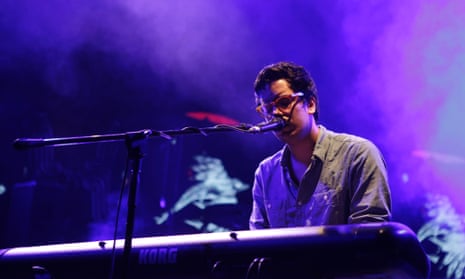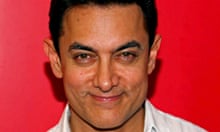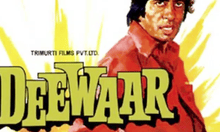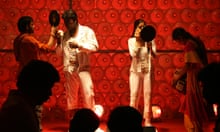In a somewhat ironic turn of events, the Pune edition of the NH7 Weekender, India’s most popular indie music festival, was a testament to the influence and familiarity of Bollywood songs. Last Saturday night, 10,000 people attended Amit Trivedi’s headlining set at the Dewarists stage. Until Sunday at least, that was the largest audience for a single performance in the five-year history of Weekender.
Two songs into Trivedi’s set, festival co-founder Vijay Nair addressed the crowd. “I see rock fans, I see electronica fans, I see folk music fans,” he said and then declared Trivedi to be “the only one who can bring them together”. Nair added that Trivedi’s appearance at his festival was “not a Bollywood musician coming to an indie festival” because he’s “the man who took independent music to Bollywood”.
Indeed, Trivedi, seen by some as the most innovative Hindi film music director since AR Rahman, has brought a certain indie sensibility to Bollywood music, by mashing folk, rock and dance music with an effortless finesse. His affinity for experimentation was the reason why he was chosen as one of the Bollywood composers to score the second and third season of television series Coke Studio @ MTV. However, the majority of his Weekender set comprised hits from movies such as Dev.D and Queen as opposed to the folk-fusion rock tunes created for Coke Studio.
Trivedi wasn’t the only act to prove the power of Bollywood at the festival. Earlier in the day, Mumbai-based Kiwi composer-producer Mikey McCleary’s the Bartender project, which plays jazz-flavoured versions of classic Hindi film songs, turned the Dewarists stage into the venue for an early evening dance party. That gig was the second time festival airing for Eena Meena Deeka, the much-loved track from the 1957 Hindi film Aasha: on Friday evening, we heard it on the same stage, during the headlining slot by US pop-rock band Goldspot, fronted by first-generation Indian-American singer-composer Siddhartha Khosla, who told the crowd that he learned how to sing by listening to playback singers Mohammed Rafi and Kishore Kumar. A couple of hours earlier, at the MTS Discover stage, Shaai’ir + Func’s Monica Dogra threw in an electropop version of So Gaya Yeh Jahan, the ballad from 1988’s Tezaab, among a showcase of material from her upcoming solo album.
Bollywood was referenced again at the Discover stage multiple times on Sunday afternoon in comedy troupe All India Bakchod’s (AIB) musical routine, which they closed with a medley of Hindi film hits. Their performance also included a song about actor Salman Khan and a lesson in the antics of composer Anu Malik, infamous for copying international pop smashes for his soundtrack tunes. More impressive was their spoof of Yeh Hai Bombay Meri Jaan, which, as they pointed out, is also a copy of a western composition, Oh My Darling Clementine. During their parody, AIB bravely took pot shots at prime minister Narendra Modi as well as India’s richest man, Reliance Industries chairman Mukesh Ambani. The tune, funnily enough, made AIB’s set, otherwise filled with uninspired jokes about ugly girls and men’s nipples, the most political of the festival.
This year, even more so than any of the previous editions, Weekender held the promise of exciting new talent, with about 80% of the 58 acts being first-time performers. Among them were Tejas and Nicholson, a couple of 20something Mumbai-based singer-songwriters whose rich, warm vocals are perhaps stronger than their compositional skills. Tejas and Nicholsonembellished their respective sets with rock and electronic elements that added heft to their performances but also showed that they have yet to reach the level when they can hold an audience’s attention by themselves. Which is exactly what British singer-songwriter Luke Sital-Singh did on Sunday, with stripped-down versions of his tracks.
But even Sital-Singh was outshone by a bunch of kids. The standout act of the festival was The Manganiyar Classroom, a musical theatre performance by a Rajasthani folk music ensemble. A follow-up of sorts to The Manganiyar Seduction, which charmed Weekender goers in 2012, The Manganiyar Classroom revolves around a group of spunky school children who stage a rebellion against their teacher. Though not as visually spectacular as The Manganiyar Seduction, the Classroom features 40 boys, aged between nine and 14, who have voices to match their on-stage attitude.
The Manganiyar Classroom is not an Indian indie act, but it falls out of the mainstream and within the scope of what constitutes independent music in this country. Nair’s introduction to Amit Trivedi was perhaps his way of pre-empting criticism that Weekender had sold out by programming a Bollywood act and was not, as the badge being sold at the official festival merchandise stall proclaimed, “100% indie”.
Trivedi’s set displeased fewer people than it delighted but it also raised a question that repeatedly comes up when examining India’s entertainment landscape these days: what exactly is indie in India? Can it still be defined in the way Nair described to me in 2012 as “anything that is not Bollywood”?
Aside from the seemingly disproportionate representation of Bollywood, this year’s edition of the Weekender was musically superior to the 2013 round. For fans of straight-up alternative rock, many of whom were left somewhat underwhelmed in recent years, there was the raucous and infectious of energy of Chennai’s Skrat and Delhi’s the Superfuzz, both of whom performed at the Bacardi Arena on Sunday. The highlight for the black T-shirt brigade however, was Skyharbor, the progressive metal band fronted by Delhi-based guitarist-composer Keshav Dhar who played to three times the number of people they did in 2011.
This year there were no missteps with the international acts – which included Malian rock band Songhoy Blues, Danish electronic dance outfit Alo Wala, and alternative rock groups Motopony and Dinosaur Pile-Up– with each one of them winning over the audience and gaining new fans. Among the more recognisable foreign names were veteran American metal act Fear Factory, whose performance drew a smaller crowd than expected because they were on at the same time as Trivedi ,and dubstep star Nucleya who drew a packed crowd at the electronica-focused Micromax Megamix stage.
The organisers took no such chances with Sunday night headliners the Vaccines, and didn’t programme any other acts during their festival closing show at the Bacardi Arena. The result? 15,000 people, a new record for a Weekender set, saw the Vaccines.








Comments (…)
Sign in or create your Guardian account to join the discussion